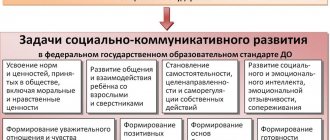Speech therapist in kindergarten
Svetlana Gogoreva
Speech therapist in kindergarten
Some parents, fortunately, do not even know why a speech therapist is needed in kindergarten . And parents of children with speech disorders had to come into close contact with the science of speech therapy and get acquainted with specialists in this field.
Speech therapy is the science of speech disorders, their overcoming and prevention through special correctional education and upbringing, which is one of the sections of special pedagogy - defectology, and is divided into preschool, school and adult. This article will mostly be devoted to preschool speech therapy . Speech therapy, which combines medicine, psychology and pedagogy, and without knowledge of the basics of these specialties, can be useless and sometimes “dangerous”
.
A kindergarten teacher-speech therapist is a multidisciplinary specialist who works with all types of speech disorders in preschool children.
What functions does a speech therapist perform in kindergarten ? A speech therapist in kindergarten conducts a complete and detailed examination of each child to determine the characteristics of his speech development. Most often this happens at the beginning of the school year, special examination protocols are used, the child’s medical record is studied, parents are interviewed, if necessary, the speech therapist can refer the child for consultation with an ENT doctor, ophthalmologist, neurologist, audiologist, speech pathologist. Ideally, a conclusion on speech The development of the child is determined collectively: by a speech therapist , a psychologist and a neurologist . And after this, the speech therapist , taking into account the characteristics of the child’s psyche and the severity of the speech defect, selects a speech correction program.
The speech correction program is carried out in stages, and in most cases, includes:
- formation of correct speech breathing,
- development of phonetic perception,
- normalization of speech motor skills,
-correction of sound pronunciation disorders,
- overcoming impairments and developing the lexical and grammatical aspects of speech,
- development of connected speech.
the speech therapist then teaches him the elements of literacy and prepares him for studying at a comprehensive school. The duration of the correction program depends on the severity of the speech disorder, the psychological and neurological status of the child, and on the professionalism of the speech therapist . Each lesson conducted by a speech therapist in kindergarten is a whole range of games and exercises, as well as various types of gymnastics and massages for children’s tongues. In classes, the speech therapist uses toys , pictures, musical instruments and a lot of various teaching aids. And the most important attribute of the classes is the mirror, in front of which most tasks are performed. has speech therapy instruments - probes for massage and sound production. A speech therapist in kindergarten regularly conducts not only frontal (classes with the whole group), but also subgroup and individual classes.
What speech disorders does a speech therapist correct in kindergarten ?
1. Impaired oral speech:
- dyslalia (tongue-tied)
– disturbance of sound pronunciation with normal hearing and preserved innervation of the speech apparatus;
-dysarthria – a violation of the pronunciation side of speech, caused by insufficient innervation of the speech apparatus;
-rhinolalia – disturbance of voice timbre and sound pronunciation caused by anatomical and physiological defects of the speech apparatus;
- stuttering is a violation of the tempo-rhythmic organization of speech, caused by the convulsive state of the muscles of the speech apparatus;
-bradylalia – pathologically slow rate of speech;
-tachylalia - pathologically accelerated rate of speech;
-alalia is the absence or underdevelopment of speech due to organic damage to the speech areas of the cerebral cortex in the prenatal or early period of a child’s development.
In addition to problems with oral speech, children suffer from a written language disorder, which is corrected at school.
2. Violation of means of communication:
-FNR – phonetic speech underdevelopment. This is a violation of sound pronunciation with normal physical and phonemic hearing and the normal structure of the speech apparatus. There may be a disorder of a single sound or several sounds at the same time. Such disorders may manifest themselves:
• in absence (omission)
sound - aketa instead of rocket
• in distortions - throaty pronunciation of the sound r, buccal pronunciation - sh, etc.
Incorrect pronunciation can be observed in relation to any consonant sound, but less often those sounds that are violated are those that are simple in the method of articulation and do not require additional movements of the tongue (m, n, p, t; most often violated:
- whistling sounds - S, Z (and their soft pairs, C;
-hissing sounds – Ш, Ж, Х, Ш;
- sonorant (lingual)
– L, R
(and their soft pairs)
;
-rear lingual – K, G, X (and their soft pairs)
.
Most often, a speech therapist in kindergarten takes children with FND for six months.
-FFNR - phonetic-phonemic speech underdevelopment. This is a violation of the processes of formation of the pronunciation system (native)
language in children with various speech disorders due to defects in the perception and pronunciation of sounds.
With intact physical hearing, children cannot distinguish or confuse similar sounds (whistling and hissing; sonorant; soft and hard; voiced and dull)
.
For example, when asked to repeat a number of different sounds or syllables , the child repeats all sounds or syllables as the same (pa-pa-pa instead of pa-ba-pa)
.
And, when a speech therapist in kindergarten asks what sounds he hears? The kid replies that the sounds are the same. It is not physical, but phonemic hearing (hearing for phonemes)
. And, as a result of a number of reasons, it turns out to be disturbed or unformed.
A phoneme is the minimum unit of sound structure of a language. Each phoneme in speech is represented by its own variants (allophones)
. A phoneme has a main variant - a sound in a strong position: for vowels - this is the position under stress, for consonants - the position before the vowel or sonorant.
Several conditions are identified in the phonetic-phonemic underdevelopment of children:
• difficulties in analyzing sounds that are disturbed in pronunciation;
• with formed articulation, inability to distinguish sounds belonging to different phonetic groups;
• inability to determine the presence and sequence of sounds in a word.
The main manifestations characterizing FFNR:
1. Undifferentiated pronunciation of pairs or groups of sounds, i.e. the same sound can serve as a substitute for two or more sounds for a child. For example, instead of the sounds “s”
,
“ch”
,
“sh”
the child pronounces the sound
“s”
:
“syumka”
instead of
“bag”
,
“syasya”
instead of
“cup”
,
“syapka”
instead of
“hat”
.
2. Replacement of some sounds with others that have simpler articulation, i.e. complex sounds are replaced by simple ones. For example, a group of hissing sounds can be replaced by whistling sapka instead of hat, “r”
is replaced by
"l"
laketa instead of rocket.
3. Mixing of sounds, i.e. unstable use of a number of sounds in different words. A child can use sounds correctly in some words, but in others replace them with similar ones in articulation or acoustic characteristics. For example, a child can correctly pronounce the sounds “r”
,
“l”
and
“s”
in isolation (i.e. one sound, not in a syllable or word, but in speech utterances instead of
“red cow”
he says
“lyzaya kalova”
.
In addition to the listed features of pronunciation and phonemic perception, children with FFDD exhibit: general blurred speech, unclear diction, some delay in the formation of vocabulary and grammatical structure of speech (errors in case endings, use of prepositions , agreement of adjectives and numerals with nouns).
A speech therapist in kindergarten children with such a speech disorder for correctional classes throughout the year.
-ONR – general speech underdevelopment. As the name suggests, with this type of disorder, all components of the speech system, that is, the sound side (phonetics)
– violation of sound pronunciation and phonemic perception;
semantic side (lexis, grammar)
- poor vocabulary, few generalizations, synonyms, antonyms, etc., errors in inflection and word formation, difficulties in coordinating words; poor development of coherent speech - the ability to tell and retell.
Children with OHP are characterized by:
•later onset of speech: the first words appear by 3-4 years, phrasal speech of two words by 5 years;
• speech is full of agrammatisms (irregular forms and variants of words)
and not sufficiently phonetically designed;
• expressive speech lags behind impressive speech, that is, the child, while understanding the speech addressed to him, cannot correctly voice his thoughts;
• the speech of children with ODD is difficult to understand.
Most often, when talking about ODD, they mean speech disorders in children with normal intelligence and hearing. The fact is that with hearing or intellectual impairments, speech underdevelopment, of course, occurs in most cases, but in this case, OHP already has the character of a secondary defect.
The formation of correct speech development is a complex process - it requires the joint work of a doctor - a neurologist, speech therapist , psychologist, educator, music worker, and physical education specialist. This work must be coordinated and comprehensive. By actively influencing the child with specific professional means, teachers build their work on the basis of general pedagogical principles. At the same time, by identifying objectively existing points of contact between various pedagogical areas, each teacher does not carry out his work in isolation, but complementing and deepening the influence of others. Therefore, taking into account the individual characteristics of each child with speech impairments, preschool education specialists outline a unified set of joint correctional and pedagogical work aimed at the formation and development of the motor, intellectual, speech and social-emotional spheres of personality development of a preschool child.
And at the end of my work, I would like to say that parents play an equally important role in the speech development of children. Therefore, in addition to classes with the child, the speech therapist in the kindergarten provides consultations to parents, during which he explains to the parents the child’s speech defect and teaches the necessary techniques and exercises for homework.
Thank you for your attention!
Qualities required for work
Before we begin to analyze the main professional responsibilities and functions of an employee, it is worth talking a little about what important qualities and character traits a speech therapist should have. And this is really important: children often worry and feel awkward when communicating with this specialist. A competent professional must possess certain skills and character traits in order to be able to win over children.
A children's speech therapist must possess such qualities as communication skills, openness and friendliness, tact and observation. Not every person is able to work in such a specialty. Nervous, stressed, tactless people should not even think about becoming a speech therapist. The speech therapist himself is an excellent psychologist who can recognize the temperament and character of a child in a matter of minutes, as well as find the source of speech problems.
History of the profession
Logos - speech, Paideia - education. This is how the name of the craft in question can be translated from Greek. Speech education is a short but capacious description of the profession of a speech therapist.
The profession of speech therapist was born not so long ago - in the 17th century. The best teachers in Europe tried to combat hearing impairment in children. Devices of varying degrees of whimsy were developed, and special techniques and methods of treatment appeared. However, over time, speech therapy only grew, absorbing more and more different problems and disorders. As the 20th century approached, speech therapy became relatively similar to what it is today: the work of correcting speech defects.
By the 21st century, speech therapy includes a great variety of different theories, methods and methods of treatment. Any speech therapist in a kindergarten for children, at a school or in a simple clinic has a rich range of knowledge and skills.
First group of job benefits
Like any other work activity, the profession of a speech therapist has a number of “spiritual” and “material” advantages. If we talk about the intangible component, then the only thing worth highlighting is usefulness. The point is that, despite not the smartest opinions, the profession of a speech therapist is still very useful and necessary for society.
Every person wants to speak clearly, competently and clearly. There are probably no people in the world who would like their own speech impediments. A speech therapist comes to the rescue here.
Professional Responsibilities
It is especially important to list the main professional functions and responsibilities of the employee. It is what a speech therapist does that best characterizes the profession itself.
What are the main responsibilities here? Here are the most basic ones:
- qualitative examination of patients, during which the main features of speech development should be identified;
- making a diagnosis, identifying the main problem;
- a set of methods and methods of treatment;
- carrying out the main groups of work - so-called classes with a speech therapist (this includes conducting exercises, issuing “homework”, assistance in the development of basic speech abilities);
- evaluation of results based on the results of classes, comparison of results with initial data.
Thus, a specialist such as a speech therapist has a fairly large and structured number of responsibilities. Reviews of the work of these professionals are, as a rule, entirely positive. And it cannot be otherwise: a person has studied and practiced methods for developing human speech characteristics for at least five years. Of course, this is bearing fruit.
Features of the profession
The profession of a speech therapist has many interesting and surprising features. Some of them are worth talking about separately.
A speech therapist must have incredible patience. It is probably no longer a joke to say that the best speech therapist would be some soulless robot. After all, you need to love your job very much in order to give the same recommendations time after time, in a calm manner, to not the most assiduous children (and even some adults). Excellent speech therapists are people who can convince even a child how important it is to be able to speak beautifully and clearly. But, unfortunately, not everyone can create the necessary motivation in a patient.
A speech therapist must be an excellent psychologist. Each patient must have an individual approach. If this is a child, you need to remember the basics of developmental psychology, critical and lytic periods; if this is an adult, mature person, it is worth remembering that he may have various kinds of complexes and mental disorders.
Getting a profession
Where can I get training to become a speech therapist? Today, in almost every major city in Russia or other CIS countries, there are many higher educational institutions that are ready to provide their services for quality education of citizens. Work as a speech therapist can be obtained after training in such institutions as:
- MGPU - Moscow State Pedagogical University. Today this university remains one of the best pedagogical institutions in the world. Here you can qualitatively master the profession of a speech therapist, after which you can work in leading clinics, schools and other institutions in the country.
- Sholokhov Moscow State Humanitarian University is the country's leading humanitarian university.
- RGPU named after Herzen is another elite pedagogical university.
- Wallenberg Institute of Pedagogy and Psychology.
Naturally, there are many other universities in the country that are ready to provide a course in speech therapy.



